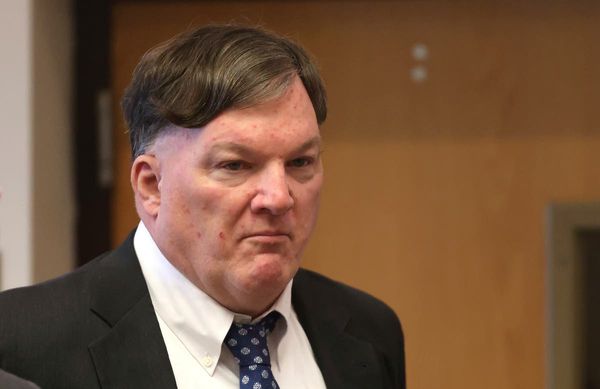
Stacey Abrams' work on voter rights helped President Joe Biden win Georgia—and beat Donald Trump—in the 2020 election.
Now, she's focused on electrifying everything in America. She's joined Rewiring America, a nonprofit that helps businesses and households access tax credits and rebates to go electric.
Abrams appeared at Fortune's Impact Initiative conference in Atlanta this week. In an interview with CEO Alan Murray, she also discussed her career as a writer, how companies should respond to threats to DEI efforts, and the importance of positive stories.
Watch the full video interview above or read the transcript below.
Alan Murray: It was about a year ago that President Biden signed the Inflation Reduction Act into law. And one key part of that act was some pretty remarkable rebates for low and moderate income households. As it stands, if you make less than 80% of the area median household income, you can be fully refunded for up to $1,800 a year in home energy costs and appliance upgrades. For this next session, I'm happy to be talking to author, former Georgia House Minority Leader Stacey Abrams, who has thrown herself into the challenge of getting people to avail themselves of these new rebates in order to electrify everyone.
Let me welcome to the stage Stacey Abrams. Good to see you. You have some fans.
Stacey Abrams: Hi, I do.
Alan Murray: All of you may not know this, but the governor of Georgia is sitting about 200 feet away in the next room. I wonder if we should get him in and have a…
Stacey Abrams: It's your show.
Alan Murray: Well, okay, we don't do politics here. First of all, let me say it's an honor to have you here. You are, and all of you may not know this. We all know a lot about Stacey Abrams' role in the voting rights efforts. But she is a true polymath. A Renaissance woman. Not only a House Minority Leader, first black woman to run for the Senate, but also a novelist. Couple of novels. I've downloaded them. I've gotten started a little bit.
Stacey Abrams: Actually 15 books.
Alan Murray: Everybody got that number? 15 books.
Stacey Abrams: I just want your Amazon queue to be completely loaded.
Alan Murray: Yeah, I'm starting with the most recent one.
Stacey Abrams: Yes please. Available at your local bookstore.
Alan Murray: I learned backstage she is a foodie, a chef, which we're not going to talk about in the short time we have here. But this Rewiring America. Your role in electrification is really interesting. And we'd love to start by having you talk about that. What are you doing? Why are you doing it? Why is it important?
Stacey Abrams: So 42% of all carbon emissions come from the household. So it's what you use to wash your clothes, how you heat your home, how you cook your food, what you drive. So 42% of the emissions come from the home. Some portion of the investment to address climate change should come to the home. And the Inflation Reduction Act added $8.8 billion in direct rebates and tax credits that go to families.
Alan Murray: That's real money.
Stacey Abrams: Real money. $1,800 a year in what we call an electric bank account. It will yield...that $8.8 billion will leverage $859 billion in commercial activity because people have to go and buy these machines. We're talking about 1 billion machines that need to be purchased for the home over the next 10 years. And my job is helping Rewiring talk about how we get this done. Because most folks, especially the ones we're targeting, low to moderate income families, they don't know or they don't believe. And if they know and believe they have a cost. There's a cost interference. The upfront costs for trying to do this, trying to wait through a tax credit, trying to figure out how to get your rebate, it's hard. It creates a friction that stops them from even starting.
Alan Murray: And how do you eliminate that friction?
Stacey Abrams: So, I'm glad you asked. Rewiring America, we built a tool. A very simple online tool to start that just helps you understand what you get from the IRA. But what we're adding to it are additional tools that help you find a contractor, help you understand where to get those machines, let you know what your family can afford, and how to get it.
The two challenges that we're very aware of. It's the upfront cost and so we're working. We're actually bidding for resources to help cover those costs for the…
Alan Murray: Financing. We pay upfront and then…
Stacey Abrams: Exactly and we will help you get your credits later. And then we're also making sure that you understand what it means and how it changes the cost for your home. So, for example, if you get a heat pump, we think heat pump means heat.
It actually means air conditioning, too. And if you remember the heat bubble that was in Oregon two years ago that killed all those people because they've never had central AC, this saves lives. And as we watch more extreme events take place across the country, this is a way that we can protect our families, protect our homes and protect our future.
Alan Murray: Is this full time for you?
Stacey Abrams: It is not.
Alan Murray: But it's not a simple task.
Stacey Abrams: It is not.
Alan Murray: Is it working? Are you getting people over that friction bump?
Stacey Abrams: We are. So, there's a lot of work that's already being done in California, on the East Coast. And so, we're intentionally in places not there. So, we're in the Midwest, the Northwest, Southwest and the Southeast. Shockingly, I'm doing a few projects here in Georgia. The goal being to show people what this can mean, and use it to demonstrate to others that there is a way to make this work for all families.
Alan Murray: The Inflation Reduction Act was obviously a game changer for this country. We have been a little laggard in terms of policy on climate and suddenly left to the head of the pack, at least in terms of incentivizing action, like the one you're talking about. But critics have said it has an awful lot of strings attached. You know, on bigger projects you have, you run into these local sourcing, native sourcing, national security concerns. You've got a lot of labor rules tied into that. It's not only complicated for the constituents you're talking about, it's kind of complicated for everybody, even big companies.
Stacey Abrams: It's an awful lot of strings, but it's an awful lot of money. We're talking about $278 billion that have already been let to suit 272 projects, 44 states, and 170,000 jobs that we believe can be created across the country. And so with that in mind, the goal is to use this opportunity to learn how to create this, not just for the short-term, but to create a long-term transition in our economy that keeps up with the reality of environmental change.
Alan Murray: So you're a fan?
Stacey Abrams: Yes, 100%.
Alan Murray: I want to change the subject a little bit to another because you pointed out, this is not your full-time job. You are a polymath. You have fingers in more pies than you have fingers. Another thing that's been a topic of conversation over the last 24 hours among this group, is the spate of lawsuits challenging a variety of corporate diversity efforts. I know you're talking to some people about defending those about what's going on there. What's your view of what's happening? And what can the people in this room do to make sure that they're not subject to legal action?
Stacey Abrams: Well, let's start with the end in mind. There's no way to avoid being sued. Because it's working. The attacks on DEI are directly a response to the effectiveness of actually matching our commercial side and matching our economy to our populace. That's a native good, but there are those who are very resistant to it. Who would like to both ignore the past and I would say want to manufacture a false future. Where we disallow participation from communities that for so long were not included. But we also know it is lucrative. Companies that participate in DEI make more money. When you add people to the roster...I mean, let's go back to Rewiring. One of the things we know about the energy economy, we need 1.4 million additional people just to take on the jobs for the residential side of electrification. But if they can't be introduced into those apprenticeship programs because they're targeting populations that are typically not participating, then we're never going to get the workforce we need. I would say that, first of all, thank you for those of you who are willing to engage. Thank you for your bravery.
But also remember your bottom line. You make more money when more people can afford to use your products. And when we improve access in this country, we improve the bottom line for everyone. Lawsuits are designed not for victory, but for chilling effect. And the chilling effect is when you decide to unilaterally disarm for fear of being attacked. I'm in politics, if you do that, you never go anywhere. Unilateral disarmament only works if you already have everything you need.
Alan Murray: But Stacey, having said that, nobody in this room. Nobody in this room wants to be caught up in this legal fight. No one does. And they don't want to be caught up in the political fight, either. So are there things they can do to minimize the risk? You can't avoid the risk. Minimize the risk?
Stacey Abrams: So, the challenge is that the risk is a fundamental attack. This is not a question of how do you game the system? It is a fundamental question of whether or not we're going to address inequity and diversity. They're attacking military academies. We know that the military was the first major institution to engage in desegregation. And one of the lawsuits is seeking to end access to military academies. We know that people of color are more likely to be enlisted. But they are less likely to go through the military academies and have the means of access. And so I would love to give you the fun answer, which is "Oh, just keep your pride and you'll be fine." But this is actually a moment for action.
This is a transformative moment where we can do right and do well.
We can do good and do well at the exact same time. You can gird yourself by making sure that we're creating a new narrative. Part of the way they're winning is that those of us who agree are silent. And not this community, but there's so many who are going silent, hoping that if they just stand still and keep their mouth shut, no one will notice them. They've already found you. They know who you are. And so the issue is, it is more important that we bind together. That we use our philosophical premise, which is that we want to do well. I'm a small business owner.
Alan Murray: Yeah.
Stacey Abrams: We can do well and do good. But we have to defend the fact that it makes sense that more people have access to the American dream. And that's your fundamental premise.
Alan Murray: You know, it's really important that you're saying that. One theme I've heard over the last 24 hours from members of this group is, "Hey, we're doing all the same stuff we were doing before. We just aren't talking about it as much." You're saying there's a cost to not talking about it as much.
Stacey Abrams: There's a cost not. And you and I have a mutual friend who has just been sued. Not because she didn't stop talking about it, but she didn't know anyone else was paying attention. And they found her. We know that when you are silent, silent is often seen as consent. We are agreeing to the attacks. We are agreeing that they are correct. If we do not push back and push… I mean, you guys know this, silence when your competitor is putting their narrative into the air and you are silent. Your competitor wins. And the same thing is true on DEI. This is not about changing your value system, it's about articulating those values.
Alan Murray: That's a strong message. Anybody? Any questions?
Stacey Abrams: You know, it's really ironic that I'm getting silenced in that.
Audience member: Stacey, thank you for your leadership. What can business leaders do with regards to Rewiring America? Get their employees? I mean...
Stacey Abrams: Absolutely.
Alan Murray: And when you're done, can you pass the microphone to this woman sitting right in front of you so we get her question? Yeah, go ahead.
Stacey Abrams: So, if you will sign up with Rewiring. Go to Rewiring America.
We're actually in the process of getting letters of support for our efforts. Find me, I'm right here. But we are… We're going to ask employers because your employees want these these rebates. They want this help. And so we will be creating a roundtable of businesses to help us push this information out. It makes it better for you because their costs go down. And their money goes further. So we'd love to have your help.
Alan Murray: It's a great benefit. Yeah, go ahead.
Jackie Martin: Hi, Jackie Martin. Fox Factory. I didn't have a question. You said, everything I would imagine. I just wanted to thank you for your courage, your role model-ship, if that's even a word, and your resiliency. Everyone here in this room wants to say and should be saying, if not shouting from the rooftops. So thank you for that reminder of courage.
Stacey Abrams: Thank you.
Alan Murray: You got fans in this room. One of the ironies of this moment in sort of corporate history is companies are really stepping up and recognizing that things like climate change and inequity are existential problems for them in the long-term. But I don't think they've gotten to the point where they realize that our political dysfunction is also an existential problem to them in the long-term. I talked to so many CEOs who stand up on climate, stand up on social inequality. But say, "Please, please, please, don't get me involved in any kind of political debate. Because I don't know how to deal with it."
Stacey Abrams: And I understand the reticence that politics is a stalker, whether you want to be there or not. It's going to find you. So my posture is I don't have to have an opinion about everything. But when I believe something, I have to have an opinion about that. And I think the challenge is calibrating where your opinion matters and where it ties to your business bottom line. If what you do affects people and if what you're silent about will harm them, then you have the responsibility to speak up.
Alan Murray: That's well put. We were talking about that earlier. Quick question, right here.
Audience member: Hi, Stacey. Thank you for everything that you do. So my question is going back to your combat action and voice. And thinking about the lessons that corporate America learned in their own racial awakening after George Floyd. So what would your advice be to corporate influencers? Frankly, right? All these CEOs and C-suite leaders who have the podium and have the national ear. What can they learn from the actions they took in the voice that they used for George Floyd in this moment, as we think about the future of diversity, equity, inclusion?
Alan Murray: In 30 seconds or less.
Stacey Abrams: Talk about the successes. Right now, the narrative is only filled with the stories of failure or difficulty. We know that transformation is difficult. We know evolution is difficult. But when you tell the positive stories, it starts to create a counter-balance. And that's where we start. Talk about how it's helped you improve your bottom line, how it's improved your workforce, and how it improves your ability to deliver your product. When you start there, it creates an environment where more people can join to amplify the good and we can start to protect against the bad.
Alan Murray: Stacey Abrams. Great conversation. Thank you so much for joining us. That was our first standing ovation.







